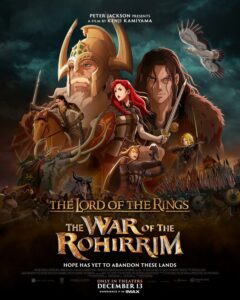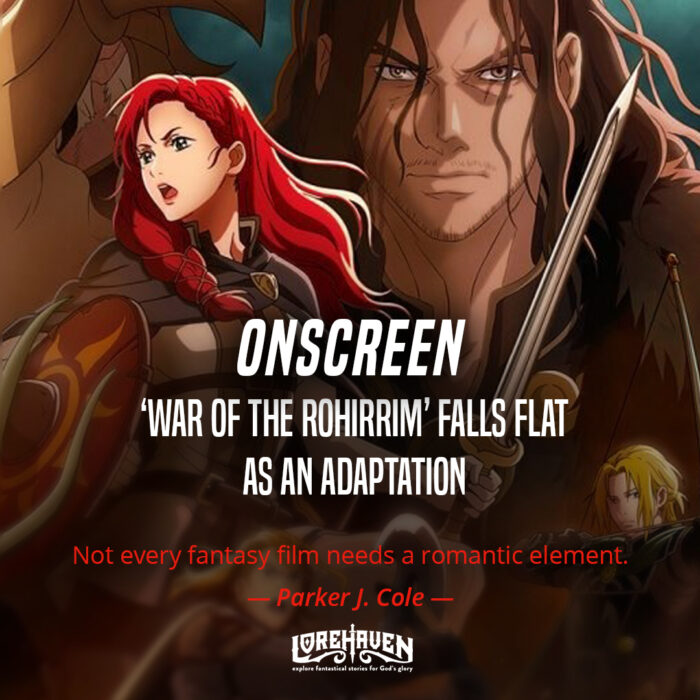‘War of the Rohirrim’ Falls Flat as an Adaptation
War of the Rohirrim is the latest installment in the expanding Lord of the Rings media franchise. Pulled from J.R.R. Tolkien’s lore, it focuses on Héra, the daughter of the legendary King Helm Hammerhand, renowned for his strength, tenacity, and bravery.
The story is an adaptation of the origins of Helm’s Deep, a stronghold of Rohan. The tale revolves around the defense of the fortress during the Long Winter, Helm Hammerhand’s defiance against the invading Dunlendings, and what gave the stronghold its name. When I first heard that this movie would be animated, I was excited. Animation has the potential to bring certain sequences to life in ways that live-action adaptations might struggle with due to budgetary or practical effects constraints.
Having seen the movie, I can say this: War of the Rohirrim is not a bad movie—it’s just not great.
 In a Screen Rant article I read a month before the film came out, the author commented that fantasy movies need romantic elements nowadays to keep audiences interested. As a romance junkie myself, I called horse pucky.
In a Screen Rant article I read a month before the film came out, the author commented that fantasy movies need romantic elements nowadays to keep audiences interested. As a romance junkie myself, I called horse pucky.
I love romance, but not every story needs to have one. In War of the Rohirrim, we do have a romantic element, but it’s unrequited love from the antagonist, Wulf, the son of Freca. In the source material, Freca wanted Wulf to marry Helm’s daughter, but Helm refused and killed Freca, leading to the events depicted in the movie. In this adaptation, however, Héra and Wulf are former friends. Wulf is in love with her, but she has no romantic feelings for him—or for anyone, for that matter. Héra values her independence and has no desire to marry.
Now, let’s set aside the fact that The Lord of the Rings is deeply rooted in European history and mythology. Historically, women’s lives were often dictated by the men around them, whether as political pawns or objects of desire. If Helm had wanted Héra to marry Wulf, she likely wouldn’t have had much choice in the matter. It’s a harsh reality of the time period that inspired Tolkien’s world.
Wulf takes Héra’s rejection as a personal attack, believing it means he isn’t good enough for her—or worse, that she sees him as beneath her. This fuels his bitterness and becomes a driving force in the story.
But did War of the Rohirrim need to have this romantic element in it? I say no.
(Across the world, romance readers of the world cry out, “Traitor!”)
Hear me out. While the story of Helm’s Deep does involve the refusal of Helm’s daughter’s hand in marriage, that wasn’t the driving force behind the war. It was the second to the last straw that broke the camel’s back.
Helm doing his impression of One-Punch Man (or is One-Punch Man doing an impression of Helm?) is what sparked the war: Helm’s legendary punch that killed Freca.
War of the Rohirrim does explore the war, but it is filtered through the eyes of Héra. This narrows the scope, shifting the focus away from the broader political and familial dynamics to the personal drama between Héra and Wulf.
As a result, Wulf’s motivations change. Instead of seeking vengeance for his father’s death and striving for power, his actions stem from his disillusionment over Héra rejecting him. This reframes the conflict, centering the story around Héra rather than the larger stakes of the war.
While there’s nothing inherently wrong with focusing on Héra, fantasy stories often thrive when personal narratives intertwine with the greater epic. How does this war impact the world? What are its broader consequences?
By limiting that focus, Héra is given the burden of resolving the conflict, and Wulf’s character is diminished. Instead of being portrayed as a formidable adversary seeking power and revenge, Wulf is reduced to a lovesick antagonist upset because of romantic rejection.
Furthermore, the heroic deeds of Helm and his sons are relegated to the background. Héra takes on the “strong female character” trope, although not to a Rings of Power Galadriel level. She wasn’t that insufferable.
To its credit, there are tragic moments and poignant scenes. Héra’s journey from a pampered, independent princess to a woman shaped by tragedy is compelling. Her resilience in the face of an adversary determined to destroy her is admirable.
But the original story already achieved this and it did so without the need for romance.





























Share your fantastical thoughts.